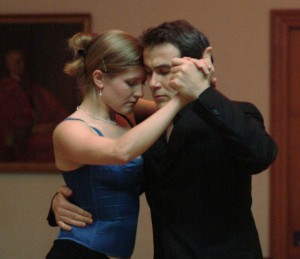To enjoy the present moment with a passion. To loose a sense of time. To exchange energy and experience vital human contact. This is part of the experience of dancing Tango. Argentine Tango, much like meditation practice, requires balance, calmness, groundedness, centering, and harmony in mind and body.

According to Sakyong Mipham Rinpoche, meditation is a way to make the mind more stable and clear. The word for meditation in Sanskrit is “shamatha”, which means “peacefully abiding.” Peacefully abiding describes the mind as it naturally is. The human mind is by nature joyous, calm and very clear. In shamatha meditation, the object is the simple act of breathing. The breath represents being alive in the immediacy of the moment.
In Tango, one becomes attentive of body and mind. With the first embrace, we notice our breath and that of our partners, our senses are magnified, particularly our senses of touch and hearing. This heightened sensitivity allows us to learn a lot about our partner very quickly, on a non-verbal, intuitive level.
Much like meditation, the tango demands that we pay attention in a way few of us have ever done before. As in life, neither partner knows for sure exactly which step will come next. Two steps backward don’t necessarily guarantee a third. Guessing or anticipating the next step is not allowed. One must always be focused on each step in the moment. If either leader or follower become distracted, important signals will be missed, and someone might get their toes stepped on, literally
Tango is about connecting with a partner, being sensitive to the music, and appreciating the surroundings, including other dancers, while dancing. Meditation is about letting the mind be present, so that we can fully enjoy and experience the present moment. If we allow our mind to be in one place long enough to acknowledge and appreciate our surroundings, then we are really here and truly alive. The practice of mindfulness that we can achieve in Tango, is the practice of being alive.
This weekend is a great opportunity to learn more about the connection between Tango and Meditation with a special class at the Shambala Center.
Tomás Howlin and Shorey Meyers teach Argentine Tango at the Shambhala Center
During this experiential event at the Shambhala Center, Tomas and Shorey will lead us into the world of Argentine Tango, using expressive movement to increase listening skills, physically express intention, and enrich our ability to be present with ourselves and others. The session will include an exploration of the rhythmicality and lyristicity of tango (musical expressions using the body) as well as the possibility of using leader and follower roles as a cycle of interaction. The event will include a combination of singular and partnered exercises, conversation, video presentation, and group discussion.
The Shambhala Meditation Center of San Francisco is part of an international community of urban meditation and rural retreat centers founded in 1973 by Chögyam Trungpa Rinpoche, a Tibetan Buddhist meditation master, artist, author, and poet.

Tomás Howlin, born and raised in Buenos Aires, comes from the culture that gave rise to the dance, and through his apprenticeship and initiation, he offers to the contemporary tango community a portal to traditional tango. Along with his knowledge and experience of traditional Tango, he has also studied different dance techniques including Martha Graham Technique, The Alexander Technique, The Feldenkrais Method, and The Franklin Method. He approaches his classes with gentle humor, engaging his students in the process of discovering the seemingly ungraspable tango. Tomas has taught at both the Halifax Shambhala Center and Karme Chöling.
Shorey Myers was captured by the music and beauty of tango at a young age. Instantly enraptured, she began to travel all over the country and world in search of the perfect tango connection. She is also a famous and devoted tango DJ, well-versed in music recorded during tango’s Golden Era.
Location: Shambhala Meditation Center of San Francisco, Main Shrine Room
1231 Stevenson Street, San Francisco, CA 94103
When: Monday, May 28th: 4:30 PM – 6:00 PM
Price: $17.00 preregister/ $20 at door
Learn more and register here: http://sf.shambhala.org